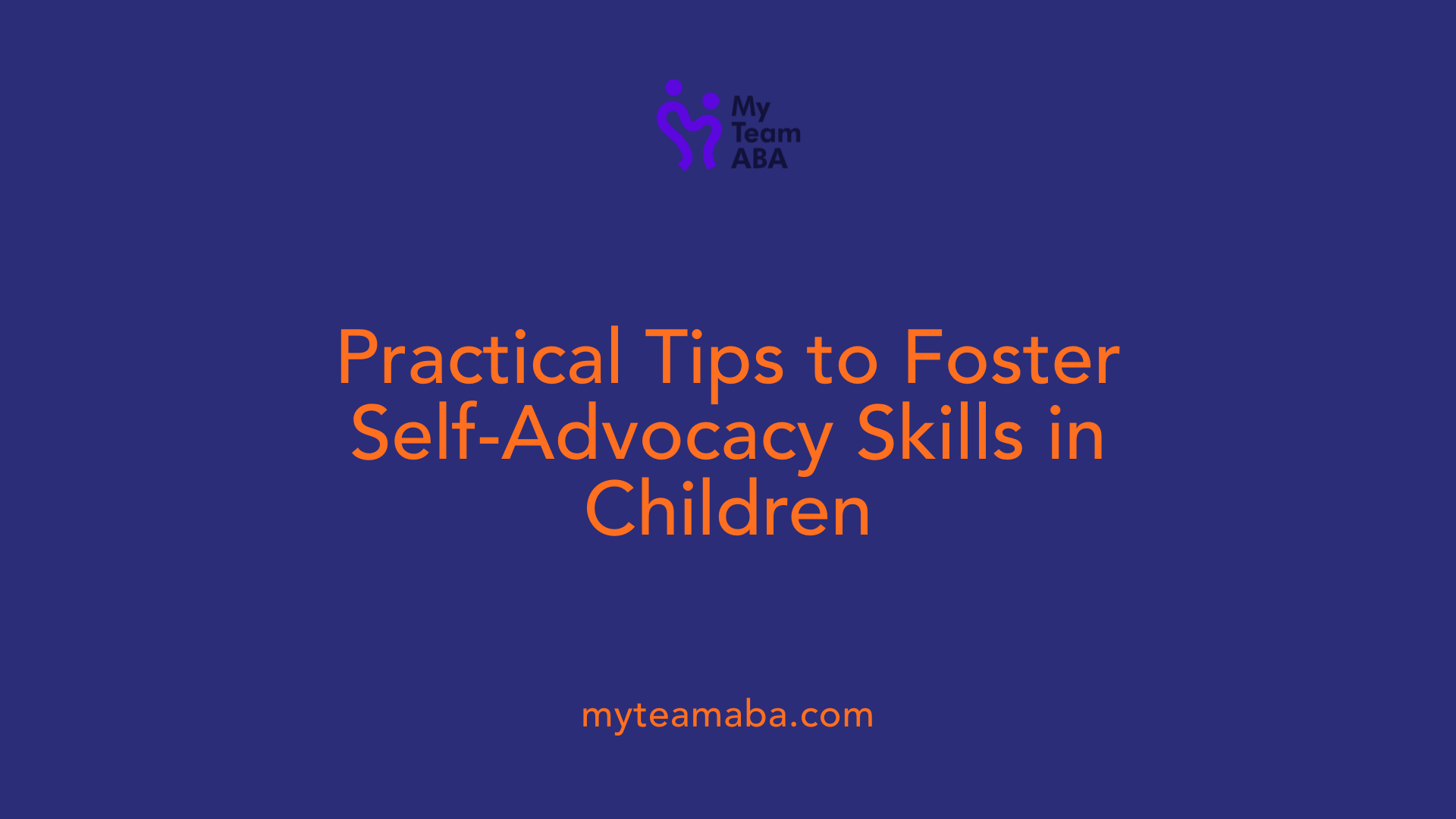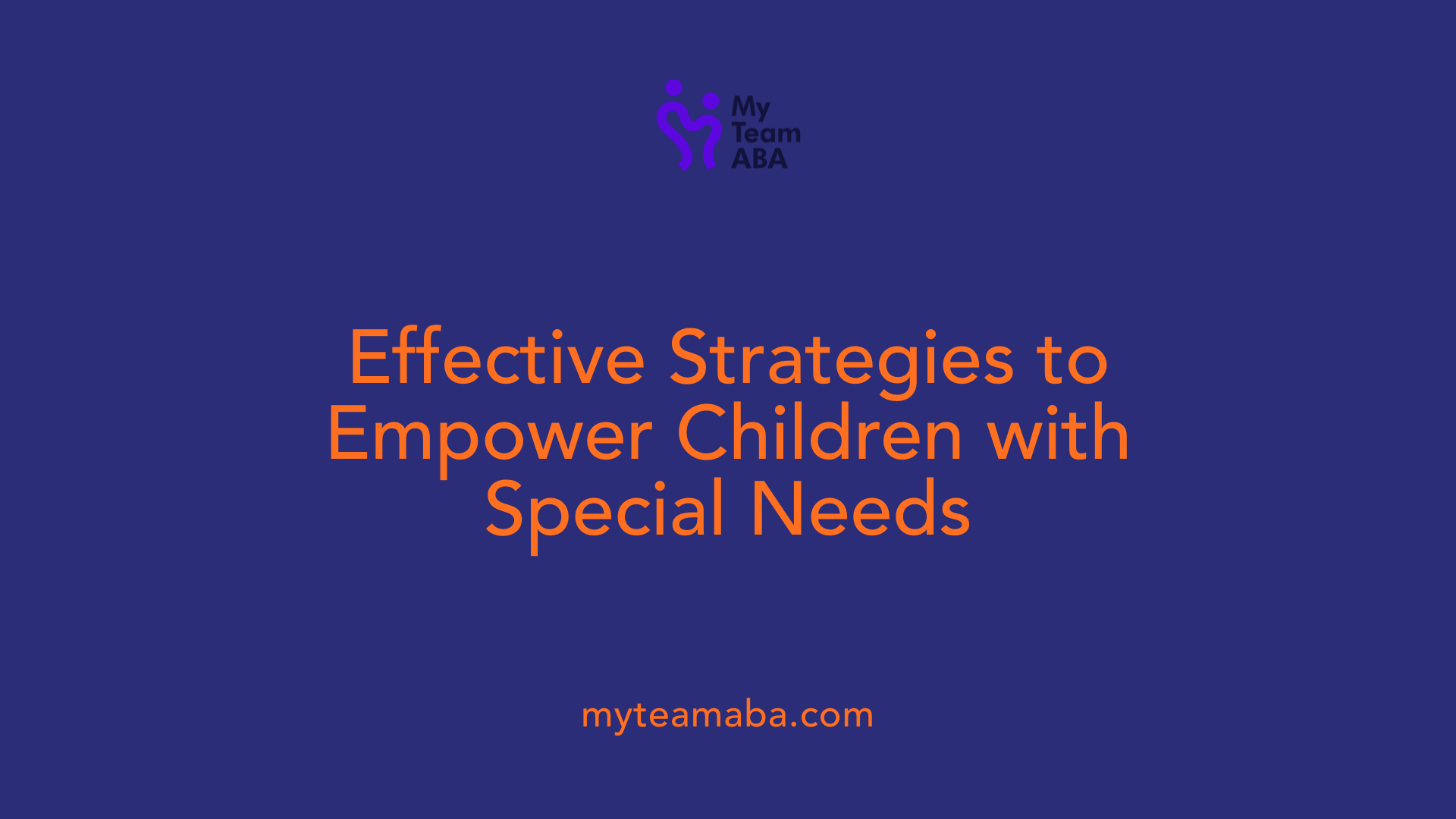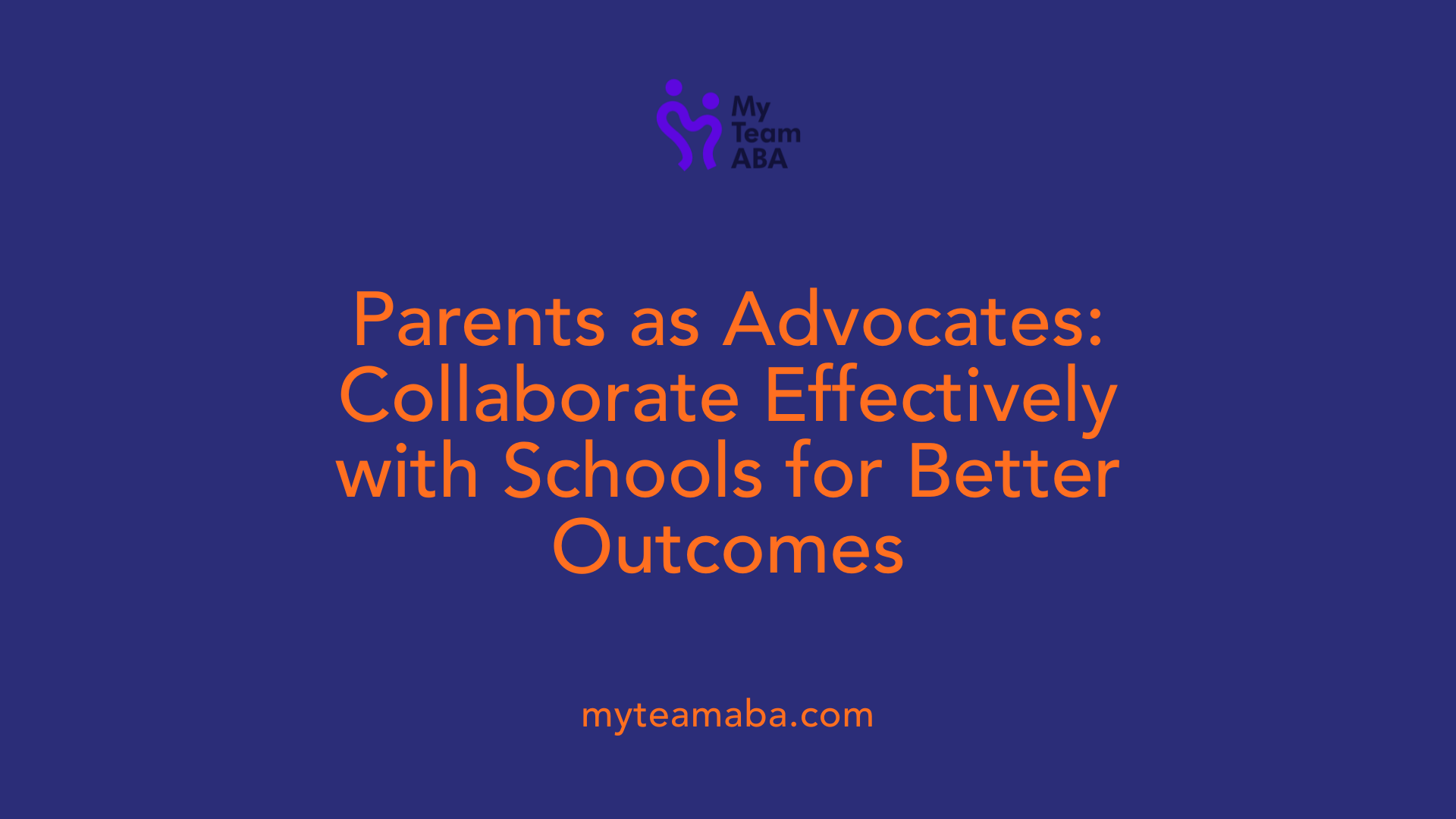How to Encourage Self-Advocacy Skills in Children Through Parent Training
July 24, 2025
Empowering the Next Generation: Strategies for Cultivating Self-Advocacy in Children

Why Self-Advocacy Matters for Children’s Growth and Success
Self-advocacy is a vital skill that empowers children to communicate their needs, recognize their strengths, and navigate various social, educational, and personal settings confidently. Building these skills from a young age ensures they develop independence, resilience, and self-awareness that benefit them throughout their lives, whether in school, future workplaces, or personal relationships. Parent training plays a crucial role in fostering self-advocacy, providing parents with the techniques and resources needed to teach children how to stand up for themselves effectively.
Understanding Self-Advocacy and Its Long-Term Benefits

What is the definition of self-advocacy?
Self-advocacy is the ability to speak up for oneself and communicate personal needs, preferences, and rights effectively. It involves recognizing what is important to you, understanding your own strengths and challenges, and actively expressing those in different situations. This skill includes asking for help, saying no when necessary, making decisions, and advocating for accommodations or support.
Why is self-advocacy important for students?
Self-advocacy plays a crucial role in a child's educational journey and personal development. It enables students to understand their rights and responsibilities, participate actively in meetings like IEP reviews, and seek resources or adaptations they need to succeed. By developing these skills early on, children learn to navigate challenges independently, build confidence, and take ownership of their learning and well-being.
How does self-advocacy contribute to academic success and personal growth?
When children master self-advocacy, they become better at problem-solving, setting goals, and making choices. Using real-life scenarios such as discussing missed homework, handling disagreements over grades, or resolving friendship issues, teaches children to articulate their needs clearly. These experiences foster resilience, teach them to question and understand their environment, and encourage independence.
What role does self-advocacy play in building confidence, independence, and self-awareness?
Confidence grows as children recognize their strengths, embrace their individuality, and celebrate their progress. Practicing self-advocacy helps children understand their feelings and develop self-awareness, which leads to better decision-making and boundary-setting. Role-playing, positive feedback, and opportunities to make choices empower children, making them more self-reliant and comfortable expressing themselves in everyday situations.
Long-term benefits
Developing strong self-advocacy skills benefits children throughout their lives. It supports them in making informed decisions, fostering independence, and asserting their needs confidently. Whether in school, workplace, or personal relationships, these skills enhance their ability to resolve conflicts, build relationships, and pursue goals. Overall, teaching children to advocate for themselves sets a foundation for self-empowerment, creating confident, independent adults capable of navigating life's challenges effectively.
Strategies and Techniques for Teaching Self-Advocacy at Home and School

How can parents foster self-advocacy skills in their children?
Parents play a vital role in nurturing self-advocacy by promoting self-awareness, confidence, and independence through everyday practice. This includes encouraging children to openly share their thoughts, feelings, and needs in various situations. Providing opportunities for decision-making, such as choosing clothes or activities, helps them practice making choices and expressing preferences.
Parents can also foster self-advocacy by discussing their child's rights and boundaries, especially regarding personal challenges or learning differences. Using role-plays and modeling advocacy behaviors demonstrates appropriate ways to express needs. Giving positive feedback when children advocate for themselves builds their confidence. Creating a supportive environment where asking questions is normal helps children become comfortable speaking up.
Supporting self-exploration and normalizing the act of asking for help instills the belief that their voice matters. Overall, intentional teaching, combined with everyday encouragement, helps children develop the skills and mindset necessary for lifelong self-advocacy.
What activities can help children develop self-advocacy skills?
Engaging children in activities that simulate real-life scenarios builds their ability to communicate needs effectively. Role-playing situations such as ordering food at a restaurant, asking for help from teachers, or explaining their feelings during a disagreement provides practical practice.
Activities like 'Would You Rather' enhance decision-making by encouraging children to consider personal preferences and feelings. Using social stories and guided discussions about rights and boundaries supports their understanding of self-advocacy and social cues.
Collaborative learning, such as group projects or problem-solving tasks, encourages children to advocate for their ideas and listen to others. Explicit instruction on how to identify support networks, what phrases to use, and how to plan advocacy conversations bolsters their skills.
Reinforcing successes in advocating for themselves, through praise and encouragement, strengthens their confidence and prepares them for diverse situations like medical visits, school meetings, or social outings. These activities collectively help children develop independence and the ability to confidently advocate for themselves in everyday life.
Supporting Children with Disabilities or in Special Education Settings

What are effective strategies to teach children self-advocacy, especially within special education or with disabilities?
Teaching self-advocacy to children with disabilities or those in special education involves several practical approaches.
One of the most effective methods is explicitly teaching communication skills. This includes helping children learn how to explain their disabilities, request necessary accommodations, and articulate their needs confidently. Role-playing different scenarios, such as visiting a doctor or explaining a problem at school, allows children to practice these skills in a safe, supportive environment.
Building self-awareness and confidence is equally important. Activities like setting personal goals, recognizing strengths, and reflecting on progress help children understand their unique needs. Decision-making exercises encourage independence, while discussing feelings and personal boundaries supports emotional self-awareness.
Creating an environment that supports growth involves fostering a sense of safety and openness. An encouraging atmosphere that promotes a growth mindset helps children see advocacy as a learning process, which they can develop over time. Parents, teachers, and caregivers should model advocacy behaviors, showing how to handle challenges confidently.
Accessible resources and visual aids play a crucial role in reinforcing self-advocacy. Visual supports such as social stories, charts, and templates can guide children in understanding their rights and preparing for various advocacy situations. These tools make abstract concepts more concrete and provide a reference for practice.
Understanding legal rights and participating in decision-making are the final pillars of effective self-advocacy education. Teaching children about their rights, such as those outlined in laws like the IDEA, empowers them to understand their entitlement to accommodations and supports. Involving children in meetings like IEP planning or transition programs from a young age encourages active participation, building their confidence to speak up for themselves.
Combining these strategies in a consistent and supportive manner helps children develop robust self-advocacy skills, enabling them to navigate their environments with greater independence and confidence.
Guiding Parents in Advocacy and Collaboration with Educational Teams

How can parents be effective advocates for their children in educational settings?
Parents play a vital role in supporting their children’s educational journey by becoming proactive advocates. Building strong, respectful relationships with teachers and school staff is foundational. This begins with early, open communication and maintaining ongoing dialogue about the child's progress and needs.
Participation in meetings, such as IEP (Individualized Education Program) discussions, is crucial. Parents should prepare by gathering relevant documents, tracking their child's assessments, and noting questions or concerns. Staying organized helps ensure nothing important is overlooked and fosters productive discussions.
Effective advocacy also involves understanding the child's strengths, challenges, and learning style. Knowledge of laws like the Individuals with Disabilities Education Act (IDEA) enables parents to request appropriate services and accommodations confidently. Respectful, solution-focused communication—highlighting shared goals—builds trust and facilitates collaboration.
Encouraging their child to develop self-advocacy skills is equally important. This means teaching children to express their needs and participate in decisions about their education. When children are involved, they gain confidence and independence that benefits them throughout their academic and life paths.
Utilizing available resources such as special education advocates, parent support groups, and educational guides further empower parents. These tools provide guidance on effective advocacy strategies and legal rights.
In summary, successful parental advocacy combines relationship-building, informed participation, understanding legal frameworks, and fostering children’s self-advocacy. When parents actively collaborate with educational teams, schools can better meet the individual needs of students, leading to improved educational outcomes and greater student independence.
Empowering Children Today for a Self-Advocating Future
Fostering self-advocacy skills in children is a vital component of their development into confident, independent adults. Parents play a crucial role by modeling advocacy behaviors, creating opportunities for decision-making, and providing resources and support tailored to their child's needs. Whether through role-playing, collaborative problem-solving, or engaging with educational systems, parents can build a solid foundation for lifelong self-advocacy. Additionally, employing evidence-based strategies such as Applied Behavior Analysis (ABA) techniques, social stories, and visual aids can reinforce these skills effectively. By nurturing self-awareness, self-confidence, and independence from an early age, parents empower their children to navigate life’s challenges, participate actively in their education, and advocate for themselves in myriad situations. This proactive approach ensures children develop into resilient, capable individuals ready to face the future with confidence.
References
- Self-Advocacy Skills: 14 Strategies to Help Kids & Teens Learn to ...
- How to teach a child to self-advocate: Lessons learned from my mom
- Self-advocacy: helping children speak up for themselves
- How to Encourage Your Child to Self Advocate - St Timothy's School
- Parenting to Support Self-Advocacy in your Child - Foothills Academy
- Self-Advocacy - Oklahoma Parents Center
- How to teach your child self-advocacy skills - ParentsTogether
- Guide to Teaching Self‑Advocacy in ABA - Arizona Institute for Autism
- Empowering Your Youth with Self-Advocacy Skills
